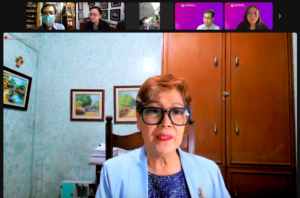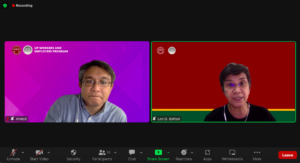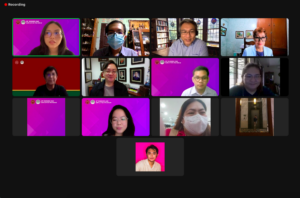To Give Back to Essential Frontliners, WEP Proposes Magna Carta of Health Workers Bill
The University of the Philippines College of Law/Law Center Workers and Employees Program (WEP) conducted a series of roundtable discussions (RTDs) on select Saturdays via Zoom, to present and improve the WEP Magna Carta of Health Workers (MCHW) bill with health workers, their organizations, associations, and unions, other labor organizations, labor law practitioners and academics.
WEP Program Director Patricia R.P. Salvador Daway emphasized, “We need a comprehensive law that will address the concerns of both public and private health workers. The services they provide us all in the community are truly critical – yet undervalued. This is a reality that has been brought to the fore and made more marked by the COVID-19 global pandemic.”
Participants to the RTDs included representatives from the Alliance of Health Workers (AHW), National Trade Union Center (NTUC) Philippines, Philippine Metalworkers’ Alliance (PMA), Sentro ng mga Nagkakaisa at Progresibong Manggagawa (SENTRO), Trade Union Congress of the Philippines (TUCP) Labor Center, Kilusang Mayo Uno (KMU), Alliance of Filipino Workers (AFW), Philippine Nurses Association (PNA), Association of Philippine Medical Colleges – Student Network (APMC), Philippine Medical Students’ Association (PMSA), National DOH Employees Association (NADEA), Davao Medical Center Employees’ Association, Batangas Medical Center, Sentro ng Alternatibong Lingap Panligal (SALIGAN), Enumenical Institute for Labor Education and Research, Inc. (EILER), and Pagaalay Ng Puso Foundation. The Department of Migrant Workers (DMW) and Former Bayan Muna Representative Ferdinand R. Gaite were also present to contribute their inputs.
The MCHW series began with the sixth WEP RTD, held on August 6, 2022 with the theme “Caring for Those Who Care: The Plight of Healthcare Workers in the Philippines.” The RTD sought to introduce WEP and the MCHW to stakeholders in the health industry, to learn more about working conditions, issues and challenges, and pleas and reforms sought.
The initial WEP MCHW proposal was composed of two separate bills for public and private health workers. These were based on bills filed in the 18th Congress.
During the RTD, two key points were discussed by the participants: (1) issues in the implementation of the existing Magna Carta for public health workers; and (2) the necessity of increasing benefits, given the rise in prices of commodities. Participants said that compliance with the existing Magna Carta needed improvement, because the payment of benefits depends on savings instead of appropriations. Discrepancy between DOH and Professional Regulation Commission statistics on health workers was also raised.
Participants hoped that the WEP MCHW would include a host of benefits, to wit:
- a separate salary schedule for health workers: with salary grade 1 at PHP25,000, entry-level salary of nurses at salary grade 15, and entry-level salary of doctors at PHP90,000, with attention also for dentists, and an across professions review of wages;
- transportation allowance for geographically isolated and disadvantaged areas (GIDAs) not just for official business, but from travel of health workers from their residences including transfers (ex. Iloilo-Manila, Manila-Busuanga, Busuanga-Coron, Coron-Culion);
- retention of step increment due to postgraduate studies after promotion to higher salary grade;
- entitlement to both longevity pay and step increment due to length of service;
- free hospitalization of health workers whether in public or private facilities;
- uniform allowance of P6,000 per year;
- quarters allowance if quarters are not available or consists of only one big room;
- sick leave and vacation leave, 15 days each;
- limiting normal hours of work at eight hours day, and payment of overtime pay for any work after, even if contract says “normal hours of work is eight hours or beyond”;
- shortened meal break in order to reduce total number of hours at work, particularly for health workers in compressed workweek situations; and
- additional plantilla positions.
NADEA participants brought to WEP’s attention its proposed amendments to the Magna Carta of Public Health Workers, submitted to the Department of Health. NADEA proposed fixing subsistence allowance for two meals and one snack/merienda to P350 a day, laundry allowance of P1,000 per month, and hazard pay of 25 percent regardless of degree of exposure.
The seventh WEP RTD, that is the second under the MCHW series, which was held on 20 August 2022, had the theme “Giving Back to The Ones Who Care of Us: Consolidated Magna Carta of Health Workers.” The amendments based on the points of discussion above were briefly presented. At this point, the two separate bills for private and public health workers were combined into one. The open forum proceeded with a detailed discussion and exchange of suggestions on the declaration of policy, definition of terms, coverage, minimum wage of all health workers, mechanism for increasing benefits, recruitment and qualification, performance evaluation and merit promotion, transfer or geographical reassignment, married health workers, security of tenure, opening of plantilla positions and prohibition on contractualization, protection against discrimination, no understaffing/overloading of health staff, and exclusive bargaining/negotiation representative.
The per provision review continued with the eighth RTD, the third in the MCHW series. This RTD was held on 27 August with the theme, “Giving Back to The Ones Who Care of Us: Magna Carta of Health Workers.” The discussion extensively revised the sections of the WEP MCHW bill on administrative charges, settlement of disputes, safeguards in disciplinary proceedings, duties and obligations, code of conduct, hours of work and breaks, overtime work, work during rest day, and right to disconnect. Due to the lack of time, WEP requested stakeholders to submit suggestions for the portion of the bill after right to disconnect to WEP via e-mail, for the latter’s consolidation.
The MCHW RTD series ended with the ninth WEP RTD held on 15 October 2022, with the theme “Dedicated to Our Health Workers: Presenting the Final WEP Magna Carta Draft”. At this point, the WEP MCHW bill covers all persons engaged in health and health-related work, thereby including even those not “employed,” such that an employer-employee relationship is not required for health workers to benefit from the bill. The primary consideration of the WEP proposal is to equalize the rights, benefits, and conditions for availment between public and private health workers, and to incentivize them not only to stay in the country but also to be assigned to rural and remote areas.
The WEP MCHW bill proposes a minimum wage of P50,000 for all health workers; increases the amount of allowances enjoyed by public health workers under Republic Act No. 7305 of the Magna Carta of Health Workers; extends these allowances to private sector counterparts creates a mechanism for automatic yearly increases of the amounts; grants the right to disconnect during rest hours, security of tenure, regular employment status, the right to self-organization, freedom from harassment and coercion; and prohibits contractualization. Changes based on suggestions from previous RTDs and from emails have been included.
After a lengthy presentation on the WEP MCHW bill, further suggestions were raised on:
- the age of children for breastfeeding by pregnant and nursing women exempt from overtime work and work on rest days;
- a 30-day per year of service retirement benefits (more than the 22.5 days under the current Labor Code);
- increasing the minimum wage but making distinctions based on different classifications of health workers, since the health workers defined in the WEP MCHW bill includes both professionals and non-professionals (administrative and support, janitorial, and security personnel);
- fixing the quarters allowance to P5,000 minimum;
- due to rapid inflation, increasing benefits every year instead of three years;
- fixing to the 20 percent the discount for immediate family members, defined to include children, cohabiting spouse/partner, and for single or solo parent health workers, the parents and siblings who live with and are dependent on the health worker.
WEP has sent to the stakeholders for final comment the revised proposal on the minimum wages for health workers, and hopes to submit the WEP MCHW bill to Congress by the end of October 2022.













































































































 on the upper right corner to select a video.
on the upper right corner to select a video.